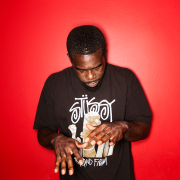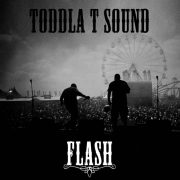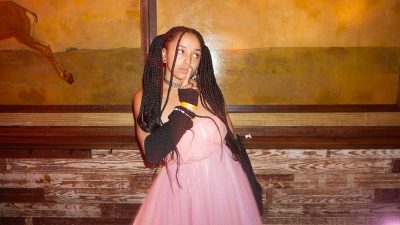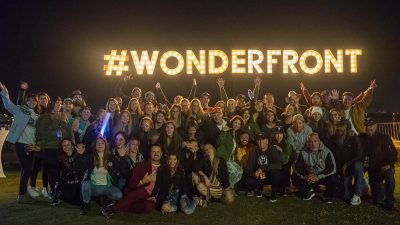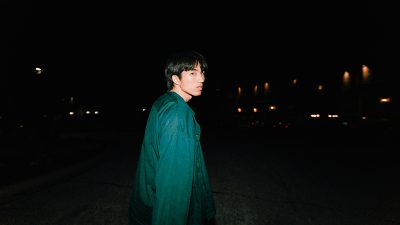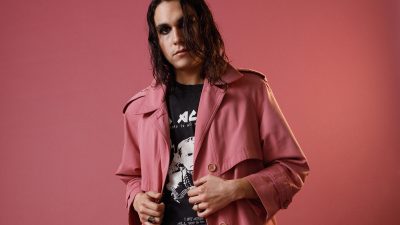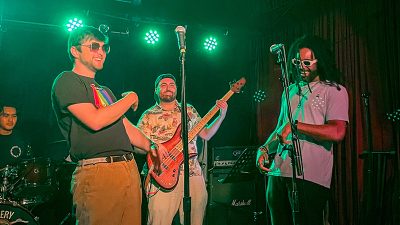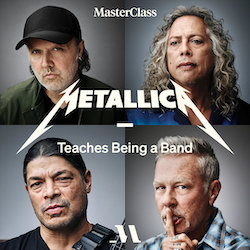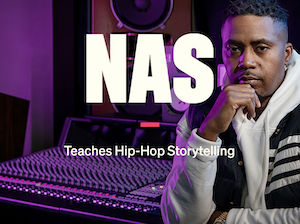Making music and digging for Born Gold
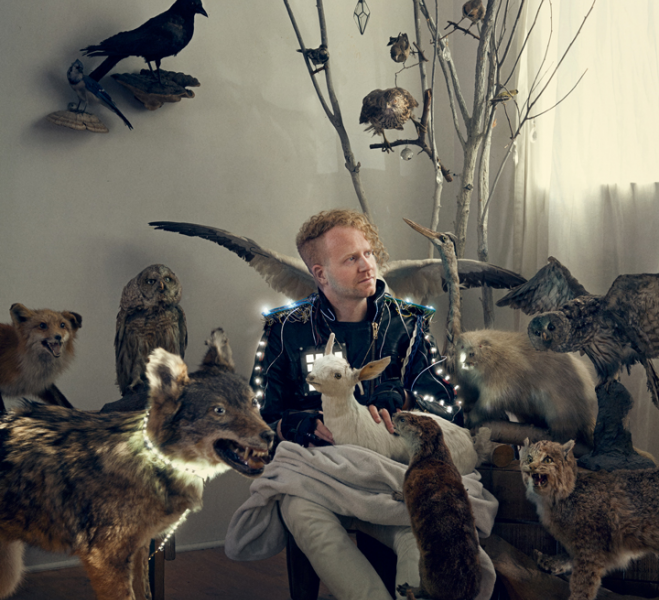
Cecil Frena, the mastermind behind the electro-pop Born Gold, is a seasoned Canadian musician currently performing and interacting in living rooms across North America. A hardcore punk-rocker-turned-creator-of-pop, Frena is a member of Canada’s healthy electronic scene that includes the likes of Purity Ring and Grimes, and is also a community in which grassroots shows like Born Gold’s current house tour tend to thrive.
Setup in a quaint apartment along Bloor, the aptly-dubbed Ewantopia house show (Frena’s Toronto gig) was an example in both camaraderie and the unification that music creates. Put on through Silent Shout and attended by local musicians and fans (and musicians who are also fans), the steamy apartment windows and futuristic-goggle-eyed opener, Zoo Owl, setup Born Gold for a packed and pumped performance. Armed with a light show and his signature luminous leather jacket, Frena rocked the house (literally) in a completely unassuming manner that felt like a pre-planned jam put on at a friend’s place. Upbeat and industrial, Born Gold was as much an auditory experience as visual.
Prior to the show, Quip had the opportunity to sit-down with the quirky Edmontonian to discuss his upcoming record and house tour. Here’s what he had to say:
Laura Eley: What was the music scene like growing up in Edmonton?
Cecil Frena: To be honest, I didn’t really think I’d be a musician until very late. I spent a long time pursuing education and that kind of thing for years and years and years, but I always had bands. They tended to be punk-rock or hardcore bands… Edmonton’s an industrial city that’s kind of tough and there’s a lot of oil money, so there’s naturally a very strong counter-culture of kids that are trying to live alternative lifestyles. So I’ve been in screamy hardcore bands most of my life. I started a festival there that’s still going off hardcore, but I don’t really think I saw myself doing it full-time. I always had a job and a girlfriend, that kind of thing.
LE: You recorded your upcoming album I Am an Exit in Arizona. What was that like?
CF: There’s a significant contingent of people from Alberta that go down to Arizona to winter. I have lots of friends and family that do this, so in the summer time their places are completely abandoned. So these are places and homes in a retirement community, so essentially I just lived in a retirement community by myself for three months.
LE: Were there locals around?
CF: Honestly, I didn’t really see anyone. I went out to eat on occasion. I’d interface with people on that level, but I had no friends. I still have no friends in Arizona. Actually that’s not true, we made some friends in Tucson on this tour, but where I was staying in this retirement community, no friends. So really it was an exercise in isolationism. Just being able to sit every night and contemplate what I’m doing, and try to get on track, just the level of focus and clarity that solitude brings. Solitude cuts either way; it’s either the most beautiful thing or it’s absolutely terrible and if you’re feeling mentally unstable and you’re alone it can be extremely dangerous. But this was a period of health for me, so it was really, really beautiful.
LE: Does this album have a theme?
CF: Bodysongs kind of has this body horror dimension to the lyrics, a lot of it almost verges on sociopathic. Little Sleepwalker is kind of a really withdrawn, surrealist, poetry kind-of-thing that doesn’t really offer a lot in terms of self-examination. And this [album] does quite the opposite. I think this record is really just this male bit of self-scrutiny, and a lot of it is looking very closely at oneself with a magnifying lens and not always liking what one sees.
LE: How would the house shows you’re currently doing be different if they were in larger venues?
CF: At the stage of the career that we’re at this feels like the right decision. It’s just thrilling to be able to play to a small room of enthusiastic people, and not have an audience-performer division, and just be able to hang out with people before and after the show. It’s really, really fun. And the batting average of the tour is so high in terms of quality of shows, we’re at like 95 per cent which is, if you ask anyone who plays club shows, really good. That being said, I don’t have any particular beef with club shows, I’ve done them before and we’ll probably do them again, it’s just neat to be able to have this opportunity to aggressively try to book a really idealistic tour… it’s like eating the best pizza every day.
LE: Is there a line that artists can cross in making too much personal information public? Do you enjoy it?
CF: It’s still fairly new for me, I did my first interview last year. I want to get better at it, I think it’s a part of the job and I actually think it’s pretty sweet. There’s definitely a line somewhere – I have friends that are very successful in music and their experiences vary in terms of how much they share and what the repercussions are. It’s true that if you share too much people develop this sense of entitlement towards you and that can have some pretty gross and ugly manifestations. But it’s also true that not being candid or not being honest sucks; like why even talk to somebody if you’re just going to put on a false front? So I tend to level on the side of over-sharing, but I’m also a person who doesn’t have much to hide because I don’t have a normal life. It’s not like my wife is going to get angry. I’ve more or less committed myself to music, so I feel like on a certain level I want to keep some spaces sacred, but I’m comfortable sharing my OkCupid profile.


